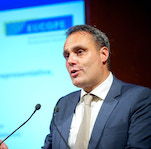
Fostering Innovative Technologies: drawing lessons from what works
Amongst the societal and personal dimensions, one of the most important lesson to take away from the COVID-19 pandemic, is the value of supporting an ecosystem for pharmaceuticals and medical technologies where small and mid-size companies can dedicate time and resources to developing innovative therapies. This was facilitated by an unprecedented collaboration between stakeholders and the EU institutions, resulting in the affirmation of the strength of European innovation in health technology with the most successful vaccines being developed in Europe.
COVID-19 showed that a healthy environment for biopharmaceutical innovation is a key element of crisis’ preparedness and response.
In 2020, the European Commission presented its vision for a Pharmaceutical Strategy that aims to create a future proof regulatory framework and to support industry in promoting research and technologies that reach patients in order to fulfil their therapeutic need. It forms part of the new industrial strategy for Europe which aims to make EU industry more competitive globally and enhance Europe’s strategic autonomy and lead the twin transitions to a ‘digital’ and ‘green’ economy by being an “…industrial innovation strategy at heart.”
Europe is home to a rich innovation ecosystem with start-ups, world-class research institutions, some of the world’s top universities for life sciences and many small to medium-sized pharmaceutical and biotech companies. However, we often see challenges in scaling up pre-clinical and clinical research into innovative medicines for Europeans.
Delivering for patients: Fulfilling unmet medical needs
For EU industries to remain competitive and resilient it is key to have a solid incentives and intellectual property (IP) framework in place which encourages industry to continuously adapt and innovate, and which allows companies ultimately make them available to the patient.
The EU pharmaceutical regulatory framework must provide predictable pathways for innovative therapies that work in unison with the IP framework, Health Technology Assessment (HTA) and national market structures for access to medicines.
Together with the evaluation of the Orphan Medicinal Product (OMP) and Paediatric Regulations there is an opportunity to significantly strengthen the EU incentive environment, drawing lessons from what works in the areas of rare disease and medicines for children as well as from the shortcomings or market failures such as antimicrobial resistance (AMR) or technologies which have not yet seen sufficient commercialisation.
EUCOPE represents 130 companies, many focused on rare diseases, largely small to medium-sized, playing a key role in the European pharmaceutical environment. Some of them have unique profiles due to their highly specialised product portfolio, no or limited revenues to date, significant risky R&D investments. For these companies, incentives are crucial to sustain (re)investments and planning cycles required to foster research in rare and paediatric diseases.
It is clear that the magnitude of the challenges and the ambitions we should have to future proof system cannot be tackled in silos and especially not only at the EU environment.
Members states along with payers, HTA bodies, patients researchers healthcare professional and all relevant stakeholder they have to work together to foster the EU health innovation environment.
We are at an important crossroads. The Pharmaceutical Strategy represents an one-in-a-generation opportunity to discuss and agree on the ecosystem we want for the medicines and medical technologies of the future.




